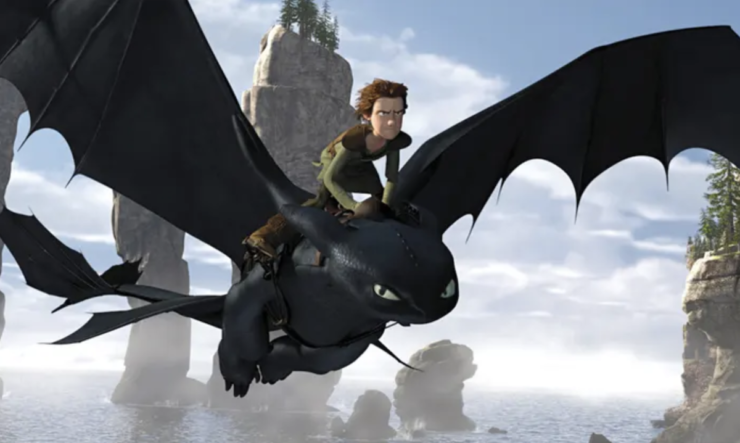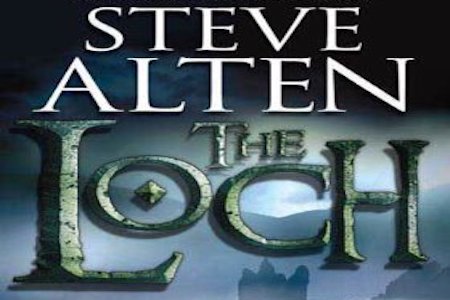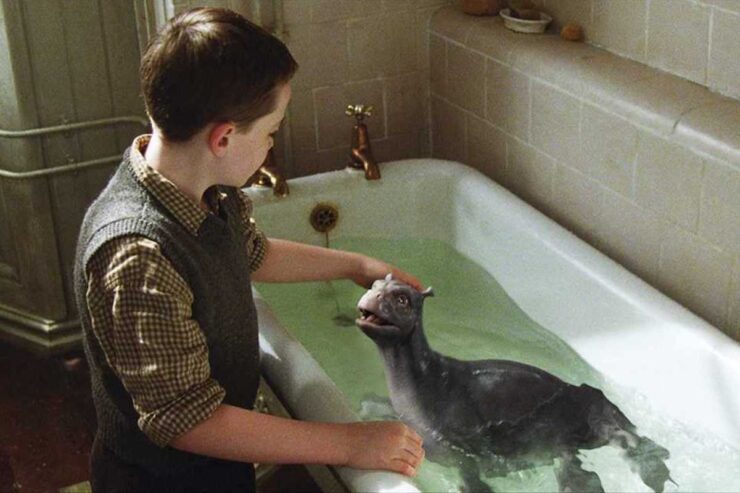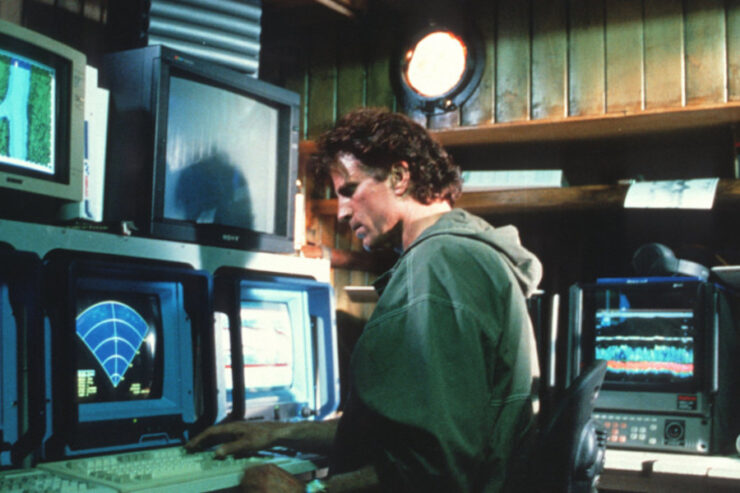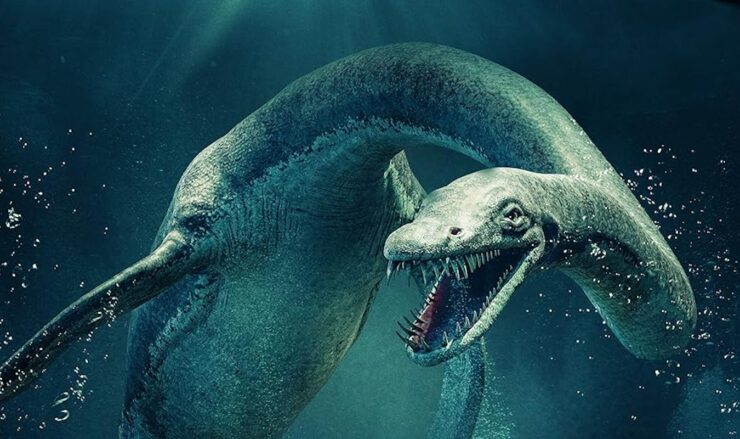I am having much too much fun with this chapter of the SFF Bestiary—and there’s still more to come. This week I actually felt as if I was playing hooky, watching movies instead of doing, you know, work.
But. Dragon movies. Movies with lots and lots of dragons. Movies absolutely filled with them. How to Train Your Dragon, three times over.
The title of the first film touches on one of my real-world preoccupations, which is animal training. Horses specifically, and dogs. In the world built by Cressida Cowell in a series of books for younger readers, as translated into a trilogy of DreamWorks films, the Vikings of Berk devote their lives to slaying dragons—until the chief’s misfit heir, Hiccup, changes everything.
Hiccup doesn’t want to kill dragons. He tries, but his one attempt results in an injured dragon. Hiccup being what and who he is, instead of finishing the creature off, first he makes friends with it, then he builds a prosthetic for its mutilated tail. By the time he’s done, he’s figured out that dragons aren’t really monsters at all. They’re just defending themselves against humans who are trying to kill them.
The methods he uses to train the dragon he names Toothless (because the dragon has retractable teeth) are the same methods that have become standard for training horses and dogs in our world. They’re all about partnership; about figuring out what the animal wants, and winning his cooperation. Hiccup rides Toothless, not just because it’s an amazing and exhilarating experience, but because Toothless initially needs Hiccup’s help to manage his prosthesis. Toothless can’t maneuver in the air without Hiccup.
But that’s not all Hiccup does. When his father sends him to school to learn how to kill dragons, he tames them instead. He wins them over. He literally has them rolling at his feet while he rubs their bellies.
His fellow students quickly see the utter coolness of this radical change in everything they’ve been brought up to believe. They can tame dragons. They can ride them.
Dragons are no longer a scourge on Berk. They’re a huge asset. They’re friends and partners. And Berk, once a grim, dark, dour place, blossoms with bright colors to match the many varieties of dragons that have come to make their home there.
In the second film, five years after the first, an evil overlord, Drago Bludvist, is luring away all the dragons in the world. He controls an alpha dragon, the Bewilderbeast, a gigantic creature with the power to bind all dragons to his will. Even Toothless is not immune to the alpha’s powers.
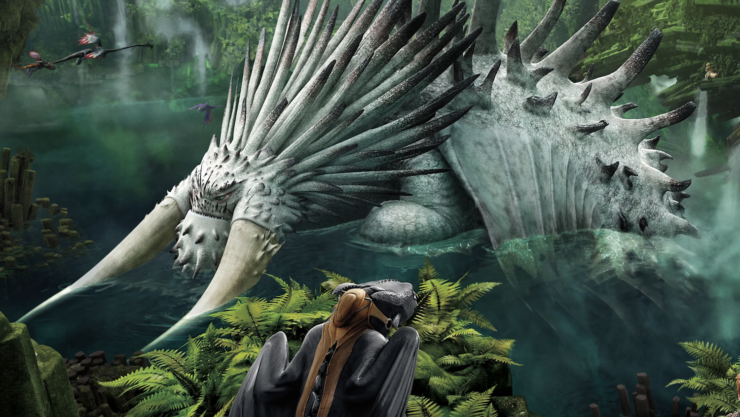
On the quest to free the dragons and overcome Drago and his alpha, Hiccup and his best friend and future bride Astrid encounter a self-professed “crazy, feral, vigilante dragon lady” who has gathered a huge flock of dragons in a hidden cave. They too are ruled by an enormous alpha, but this one protects them and feeds them.
The dragon lady turns out to be none other than Hiccup’s long-lost mother, Valka. The reunion is highly emotional and quite complicated, and even more so when Hiccup’s father, Stoick the Vast, comes to rescue his son. Stoick has not always understood Hiccup, but he has done his best; by this time he’s sure Hiccup can handle being chief, though Hiccup has serious doubts.
All of this culminates in a great battle against Drago and his alpha, with a tragedy and a triumph. An alpha dragon, we learn, does not have to be physically huge. And a chief can be a skinny nerd with a missing foot, who happens to have a deep understanding of dragons.
The third film begins a year after the second. Berk is overrun with dragons. They’re everywhere.
Unfortunately, so are dragon trappers. Worse yet, a famous dragon hunter, Grimmel the Grisly, sets his sights on Toothless. Grimmel has devoted his life to killing Night Furies, and Toothless is the last of them.
In the meantime, Hiccup has been reflecting on a legend his father told him when he was small, of the place from which the dragons came. It’s called the Hidden World, and it’s beyond the edge of the human world. Hiccup and Astrid go questing for it, and find it—but are driven out by the powers within.
Their plan had been to move all of Berk to this place. But the dragons make clear that this is not a world for humans. Only for dragons.
All the people of Berk have packed up to move on to this new world. On the way they find a pleasant valley to stop in. For once wiser than their leader, they start to build a permanent settlement.
Grimmel sets a trap for Toothless and baits it with a lady dragon, a white version of Toothless, whom Hiccup and Astrid decide to call a Light Fury. Hiccup is determined to save his dragon and his people, to shut down the trappers and put an end to Grimmel.
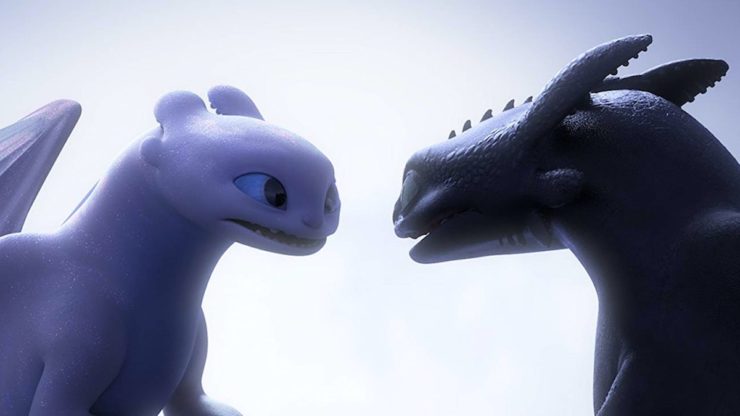
It’s clear to Hiccup that dragons will never be safe in the human world. They have to return to the Hidden World, and vanish into legend. Even Toothless, and the rest of the dragons who are bonded to his friends from Berk. There’s no other choice.
Until the end—which maybe looks forward to a fourth film. Or not. It works either way.
This truly is a world full of dragons. All shapes and sizes and temperaments and powers and capabilities. When we see the whole sky full of them, or Valka’s cavern or the Hidden World, we see just how many varieties there are. Big ones, little ones, vast ones, tiny ones. Firebreathers, poison breathers, ice breathers, lightning breathers. Nadders, Gronckles, Zipplebacks, Monstrous Nightmares. Timberjacks, Whispering Death, Snafflefangs, Deathgrippers, Skullcrushers, Crimson Goregutters, and swarms of ill-omened Hobgobblers.
They all have personalities, too. Toothless most of all. He is, basically, a very large cat, with occasional hints of dog. He communicates through movement and expression. When he’s happy, he purrs. When he’s not, he growls. He has a mind of his own, but he’ll do what Hiccup asks, mostly; frequently in his own way, at his own speed. He is never exactly tame, and he is very much his own person.
Anyone who has loved a cat or a dog or a horse can understand how Hiccup feels about Toothless, and how Hiccup’s fellow Berkians feel about the dragons who have bonded to them. Hiccup even says at the end of the first film, “While other places have ponies or parrots, we have dragons.” Though I would submit that dragons are rather more than pets, and considerably more numerous, too, once Berk becomes a haven for them.
In the end, the best anyone can do for them is send them away where no human can touch them. It’s a happy ending for them, but not so much for the humans who love them.
I’m ever so glad we haven’t had to do that to protect our horses and dogs and cats. We’re learning to train and handle them with more understanding and less force; to treat them as partners and fellow sentients. I hope we’ll continue on that way, and not slide back into old bad habits.
Judith Tarr is a lifelong horse person. She supports her habit by writing works of fantasy and science fiction as well as historical novels, many of which have been published as ebooks. She’s written a primer for writers who want to write about horses: Writing Horses: The Fine Art of Getting It Right. She lives near Tucson, Arizona with a herd of Lipizzans, a clowder of cats, and a blue-eyed dog.










